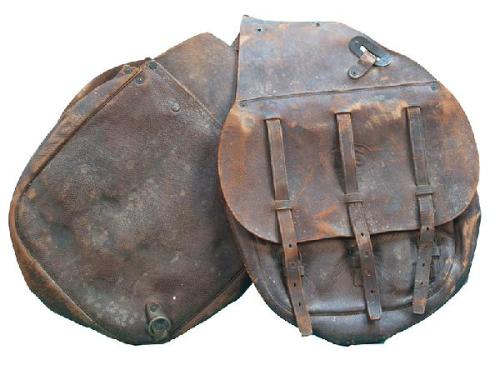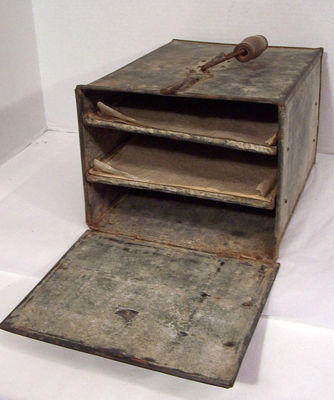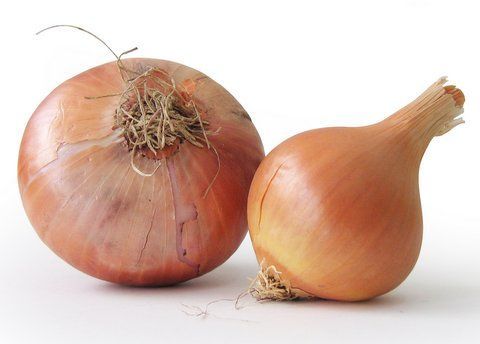An Oven and an Onion Poultice
by Deborah Medley for my daughter Melodia
Our little farm kitchen in Vilcabamba had one modern appliance, a two-burner Coleman gas stove designed for camping. For me it was the ultimate in luxury appliances since the norm at that time in “el campo” was to cook on an open fire. The stove met most of my cooking needs except for one: baking. There was no oven. Before moving to Vilcabamba, I was in the habit of baking whole wheat bread from scratch, something I had taught myself when I lived in the States and something I dearly missed doing in Ecuador. I also yearned to make pizzas and crackers. Without the stove, all I could do was fantasize while my mouth watered.

There was something else missing. We couldnʼt find whole wheat flour in our remote location. I knew I would need some if I ever had an oven. I talked to Raul day in and day out about the wonders of homemade whole wheat bread. I could see he wanted to help grant my wish for flour and an oven. I recognized the wistful expression on his face whenever I brought up the topic of hot baked goods. But since there was no flour and the only oven around was a mysterious wood-fired adobe oven down in the valley behind Sra. Beatrizʼs little dry goods shop, we resigned ourselves to fantasizing.
One day Raul came riding our horse Ragu up the slope to our casita. I could see his saddlebag was full. Gleefully, he handed me a bag full of whole wheat berries. I was unbelievably happy to have those wheat berries, and I wasted no time starting the process of grinding the berries in my hand mill. With every crank of the mill handle, a small amount of flour was produced. It was arduous, the incessant grinding. But I was on a mission to produce the largest, most lovely mound of whole wheat flour I possibly could. Eventually, I finished the milling process. And then the wait began.
Each day we wishfully looked at the little sack of flour I had produced. We ate our soups and eggs and salads. We feasted on fruit and enjoyed our steaming cups of tea. We drank fresh cowʼs milk. All of this lovely food was produced by us. It came from our gardens, our orchards, our chickens, their eggs, and our cows. There was a bounty of food but no hot whole wheat bread, no aromatic pizzas to truly sate our appetites, no crunchy crackers to slather with homemade cream cheese.
One day I had an idea to skim the cream from the top of the milk to whisk it into whipped cream, but I stirred the cream a bit too long and ended up with butter…and Raul and I swooned a bit at the taste and wished even harder for an oven. With no way to acquire one, our hopes for whole wheat bread hot from the oven and topped with our butter were, well should we say, hopeless.

Not long after, Raul came home one day with a very large and empty rectangular-shaped metal can. I had seen cans of this type in country stores at the farthest outposts of our Andean travels. The cans held dozens of cookies called Mariaʼs. The recipe was probably first introduced to Ecuador by the Spaniards when they came to the continent. The Mariaʼs are crunchy, lightly sweetened, and flavored with vanilla. They pair perfectly with fresh milk, hot tea or coffee.
Raul had a vision… of making an oven for homemade bread with butter, for sizzling pizzas, for crunchy crackers, and for our own homemade Mariaʼs. He had the Mariaʼs cookie can, and it was the size of a small oven. His idea was to make an oven, and he did it. With a small hand saw he made two holes in the can. It took time. Delicious time. Time to savor the fantasies of hot bread. I got busy mixing the whole wheat flour with honey from our bees, milk from our cows, yeast from Sra. Beatrizʼ store, a dash of salt and another dash of love. When the cookie can holes were finished being sawed, Raul showed me how they fit perfectly over the two gas burners. I could see how it was going to work. One end of the can had been sawed off and made into a sliding door, my oven door. Raul thoughtfully nailed a metal handle to the door.
My bread dough needed to rise, then to be punched down into a small ball and kneaded adequately. This process had to be repeated, and it took time. I happily spent the afternoon, waiting as the dough rose, then punching and kneading and waiting and repeating. Raul and Ragu had gone off to do business in the village, down the mountain, across the river, and through the valley.
When I saw that the dough had been sufficiently kneaded and had risen to the right size and that it was ready for the oven, I excitedly grabbed a match to light the burners. The thought of Raul coming home to the aroma of my bread was too much for me to stop to think that maybe, just maybe there were certain precautions that I should take before lighting a homemade camp stove and that I should have Raul show me how to do it properly.
With both burners on, I lit a match and opened the stove door, reached my hand inside and heard a loud boom, saw a bright flash of fire, smelled scorched hair, and felt burning skin. The explosion threw me back a few feet. The next thing I remember doing was running down the mountainside, across the bridge, over the river to Sra. Beatrizʼ store. When I entered she saw my scorched face and me holding my right hand out in front of me while I sobbed in pain and fear. The blast had burned layers of skin off my hand which was starting to swell and stiffen. Wasting no time at all, Sra. Beatriz calmly sat me down and started to grate fresh onion. I sat there beside her on her wobbly wooden bench, feeling pretty wobbly myself, whimpering and shaking. Why she was grating onions made no sense to me. But I didnʼt think to question what she was doing. Great faith that I was in good hands welled up inside of me.

Sra. Beatriz grabbed a handful of grated onion and gently applied it to the burned areas. Instantly, the fire began to calm, and so did I. She covered the onion poultice with newspaper, wrapping it around my hand and arm and tying it gently with string. With a cotton cloth dipped in cool water, she carefully dabbed at the blackened smudges on my face and reassured me that I had only lost the fringes of my eyelashes, some of the hair framing my face and a little bit of my eyebrows. No facial skin had burned. She sent me home to wait for Raul. I was told to apply fresh onion poultices daily to cool the skin and to protect the burned flesh from infection. Though the word “antibiotico” was not part of Sra. Beatrizʼ vocabulary, the wisdom she held of healing plants certainly was.
I did as Sra. Beatriz had told me and returned home to wait for Raul. By the time I was home, the pain was reduced to an annoying throb. I was exhausted and shaken up and made my way to our bed where I lay myself down and took a long nap. I awoke a little later to a very worried Raul standing over me. He had passed by Sra. Beatrizʼ store on his way home where he heard the story of the blast. He asked me if there was anything he could do, and not truly believing for a minute that he would be so domestic, I jokingly said that he could do all of the cooking, cleaning, and gardening until my wounds healed. But he surprised me, and probably himself even more so when he assured me that of course, he would do it all. Iʼm not sure how agreeable he was feeling when two weeks later he was still cleaning, cooking, and gardening while we waited for the wounds to finish healing. It was especially sweet to see him washing our clothes in the river. I didnʼt mind supervising, sharing tips on how to get stains out and urging him to wring everything out thoroughly so that the clothes could quickly dry in the sun. I believe Raulʼs ungrudging role reversal and Sra. Beatrizʼ onion poultice were the very medicines that healed my wounds.
When all was back to normal, I made a fresh batch of whole wheat bread. Raul and I ate it warm with butter. I honored Sra. Beatriz for her compassion and healing powers by hand delivering a basket of warm bread with butter to her home.





